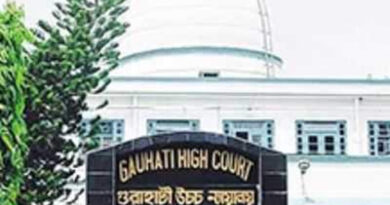Gujarat High Court Suspends Life Term of Ex-BJP MP In RTI Activist Murder Case
(Judicial Quest News Network)
The Gujarat High Court on Thursday suspended the life term sentence of former BJP Parliamentarian from Junagadh Dinu Bhoga Solanki in the murder case of RTI activist Amit Jethva and ordered to release him on bail.
A division Bench of Justice Paresh Upadhyay and AC Joshi ordered the same in an application for suspension of sentence during the pendency of the appeal against Solanki’s conviction by a Special CBI judge. Solanki was sentenced to rigorous imprisonment for life under section,302 (Murder)and 120 B (Criminal Conspiracy) of the Indian Penal Code in relation to the 2010 killing of Right to Information (RTI) activist.
The court has further pointed out that the case was based on circumstantial evidence and the CBI court’s order to convict Solanki id “prima facie erroneous and unsustainable. “The bench said that the lower court’s conclusion was based merely on “assumptions and presumptions”. The Court ordered release of Solanki on bail on furnishing Rs.1 Lakh bond and equal amount of surety. The court asked Solanki to deposit his passport and not to leave the country.
According to CBI Court, the present applicant did not satisfactorily explain, why those two persons were in constant touch. The failure on the part of the present applicant in that regard is treated as a circumstance against him by the Court below and the chain is accepted to have travelled further against him. We are afraid, this Court cannot approve conviction of any citizen based on such reasoning, that too which keeps a person behind the bars for whole of his life. We again record that, we have not reappreciated the evidence but we only note that, the CBI Court fell in error by taking into consideration irrelevant aspects and arrived at the conclusion, where no man with ordinary prudence would have arrived at, on the basis of material before it. The conviction of the applicant suffers from the vice of perversity….
It was also found that the circumstantial evidence led to many other hypotheses other than guilt of the accused. we find that there is breach of all the parameters /principles prescribed by the Supreme Court of India in the case of Sharad Badrichand Sarda (Supra) and State of Goa vs. Sanjay Thakran (Supra). When the circumstances against the applicant are taken cumulatively, we do not find any chain of evidence having been established, leading to conclusion that in all probability the crime was committed by the applicant. We further find that the circumstantial evidences in this case not only leads to many other hypotheses than that of the guilt of the accused, even false implication of the applicant cannot be ruled out.
even if the aspect of false implication of the present applicant for political consideration in the circumstances prevailing then is not gone into, the conviction under section 302 of IPC with the aid of Section 120B is less likely to be sustained.
Therefore, the sentence was suspended, and the applicant was granted bail.
Senior Advocate ND Nanavati appeared for Solanki, while Senior Advocate BB Naik appeared for the victim. Special Prosecutors RC Kodekar and Mukesh G Kapadiay appeared for the Central Bureau of Investigation.
The case has witnessed several twists and turns in the past. Initially, the case was investigated by Ahmedabad Detection of Crime Branch which gave clean chit to Solanki and arrested the six other convicts. Jethva’s father Bhikha moved to high Court which handed over the probe to the CBI, which arrested Solanki and charge sheeted him for murder, conspiracy among the trial, many witnesses turned hostile following threats.
Jethwa’s father moved the High Court again seeking fresh trial on the ground that 105 witnesses out of a total of 195 had turned hostile allegedly under pressure from the former BJP leader. By then, the trial had concluded. The court allowed his plea and ordered afresh trial. Against this order, Solanki moved the Supreme Court which partly allowed his plea while ordering the trial court to recall only 26 key witnesses for fresh examination instead of a fresh trial.
[Read Judgement Here]




